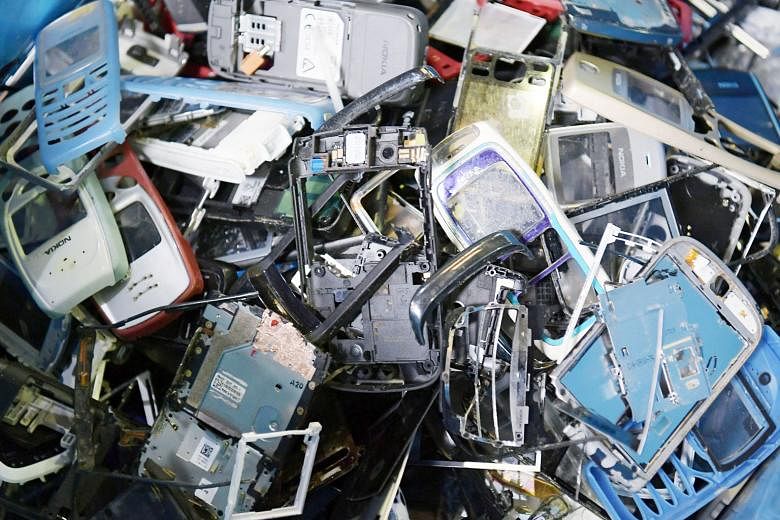The onus will soon be on producers of refrigerators and other such goods to make sure they are properly recycled or disposed of, as the Government puts in place laws to fix Singapore's e-waste problem.
For consumers, this could mean more collection points for small e-waste, and take-back services to make it easier to get rid of their larger unwanted electrical and electronic goods.
Incentives or taxes will be used to prod manufacturers and importers to meet specific targets, said Environment and Water Resources Minister Masagos Zulkifli yesterday.
"We have to look at how we incentivise and how we put in a levy or some form of fines when producers do not meet their targets," he said on the sidelines of a pre-Budget consultation session on e-waste.
But these will be put in place at a later stage. The targets will also start small and increase over time.
"A transition time is needed," Mr Masagos noted.
He gave the assurance that the informal sector - such as scrap dealers and rag-and-bone men - will be made part of the system. They could be trained to recycle e-waste properly or be involved in the collection process.
The Republic is taking its cue from countries such as Sweden by taking on the Extended Producer Responsibility approach. In Sweden, around half of all e-waste gets a second life as ingredients in new products and materials.
The move is timely, with the exponential growth of e-waste worldwide. In Singapore alone, 60,000 tonnes is produced each year, half of which comes from households. Yet only 6 per cent of household e-waste is sent for recycling, according to a recent survey.
Call for better infrastructure to boost recycling
INFRASTRUCTURE
There are about 400 e-waste collection points set up by telco StarHub in places like schools, malls and community clubs. But many consumers do not know they exist or do not find them convenient.
-
60,000
Amount of e-waste in tonnes produced in Singapore each year, half of which is from households.
6%
Percentage of household e-waste that is sent for recycling, according to a recent survey.
400
Number of e-waste collection points set up by telco StarHub, located in places such as schools and community clubs. There is no national collection system for larger household appliances.
There is no national collection system for larger household appliances.
Poor e-waste recycling means that precious metals in discarded products end up being incinerated, while harmful substances such as coolants from refrigerators are released into the atmosphere.
But while legislation will help, participants at the consultation session also called for better physical collection infrastructure.
"Recycling and collection points for e-waste need to be both accessible and visible for consumers and residents," said Mr Ashley Tan, 32, from Deloitte.
He was among 37 participants from more than 20 different organisations at the consultation, which was also attended by Mr Masagos.
Ms Ng Wai Sen, 44, from non-governmental group Journey to Zero Waste Life, said: "We need to change the mindset that new means good." She noted that this meant repairing electronics items, instead of just buying new ones.
Mr Juergen Militz, secretary of the Waste Management and Recycling Association of Singapore, suggested that manufacturers and importers pay a small fee that would go into a recycling fund.
Recycling companies can extract precious metals from laptops, but find it costly to dispose of the chemicals in refrigerants.
"If done properly, a balance can be achieved," he said.
Ms Janet Neo, head of corporate sustainability at Fuji Xerox Asia Pacific, said legislation will challenge manufacturers to rethink their business model, including designing products that are easier to recycle.
However, she noted that it can be costly for smaller players and that the Government could look at ways to help them.


